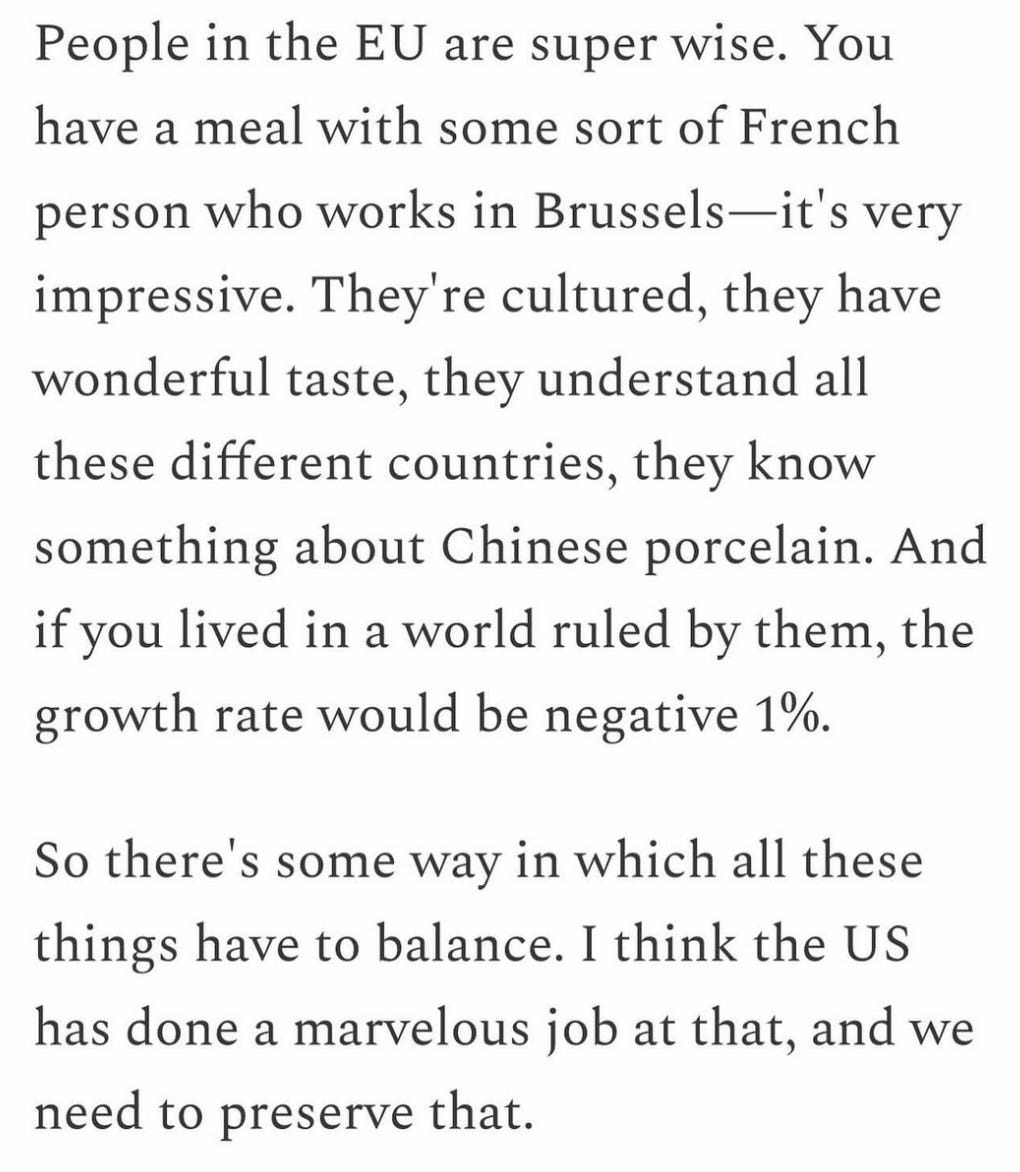Now that we’ve replaced all these people with a robot, how can we climb the CAGR?
I was a guest on the Cloudcast this week. I go over how I use AI and then Brian and I discuss how companies could get more use out of AI.
Most of it, I think, rests on how management behaves and uses AI. As with all “productivity” tools, management can get some quick-wins on “productivity” by replacing people with automation - firing humans, favoring computers. But that’s empty calories. That’s a one-time bottom line numbers juice.
After AI “optimizes” your company by removing costs, how is management then going to grow revenue and company valuation? To do that, you need to take the free time people have after automating all the bullshit tasks out, and do something new with that free-time.
Is management ready to deal with the question “now that our meatware has have 10% more free time across the board, what will we do?” Executives always complain that they need more budget, that they can’t find the “talent” they need (read: we choose not to pay people what they’re worth), that they just can’t get things done because everyone is so busy (and incompetent), etc. Well, applied correctly, using AI in the enterprise addresses some of that. Now’s management’s chance!
Part of the “ethics” thing here is more of a mindset change. In the West, we have a belief that if you haven’t suffered, real work hasn’t been done. You can’t just be killed to save humanity, you have to drag your own machine of death to the hill. We value sacrifice and suffering. If something is effortless, it must be less valuable and, likely, not even real work.
So, in a corporate setting, if all the sudden you can spit out text and ideas that previously took a week…we don’t know how to deal with the ethics or that. Did I do actual work? Should I be paying this person for just asking a computer for a “FY25Q3 marketing strategy” and then getting a draft that what would have taken two weeks of meetings? Is it unethical for me to “take credit” for the work? Is it like taking credit for the work Excel does for you (“they’re a wizard at Excel!”), or taking credit for the work that one of your staff does for you (“they steal ideas from their people”)?
This goes both ways though: what’s the ethics of an executive using an AI to write routine internal emails. Internal communication in a company is very expensive, important, and risky. Creating it takes many skilled hands, many meetings, and usually leads to boring, barely functional text. And if the workers reading it misunderstand it and go off in the wrong direction, that negative effect compounds. Worse, it could demoralize them! And, if employees thought the executive uses AI to write one of these emails, some (many?) workers would think it was disingenuous and slimy.
Another thought-tool: executives hire management consultant firms to do studies and come up with strategy. How is this different than them using ChatGPT to do the same? The answer to this is helpful as well: strategy is just step one of hundreds. Once you have the strategy doc, you now have to figure out how to apply it, how to adapt to reality, and all the other stuff we call “execution.” You could ask the management consultants (or ChatGPT, Claude, etc.) to help there, but then you’ll still need to actually do the work. AI doesn’t do the actual work, meatware does.
Despite all the AI glory-talk, I’d wildly estimate that less than 10% of knowledge workers are using AI seriously for their daily work. We have no idea what how enterprises will apply and benefit from generative AI usage once 30%, 50%, 80% of them use it “all day long.” I don’t think anyone is prepared for what to do after all that productivity is disgorged onto the meeting room table. In your enterprise AI strategy, is there a slide that says what you’re going to do with all that free time your meat-sacks will have?
As with instant messaging in the 2000s, there’s plenty of shadow IT going on. At the moment, those workers are getting a boost over everyone else. In a delightful twist on productivity-by-firing, AI is likely benefiting individual workers more than corporations right now.
Anyhow. Brian and I talk about all that in the discussion. More importantly, I also give a slight overview on using AI to play D&D.

Relative to your interests
The Ultimate Guide to Grappling in D&D - This is one of the more obscure combat actions in D&D, but actually seems really useful, especially. for lower level characters.
Sonos’ interim CEO hits all the right notes in first letter to employees - This “hey, I’m the new executive” memo is some well done internal comms. He literally has a Sanos tattoo and mentions three times that he’s uses the products.
Understanding Private Cloud, Hybrid Infrastructure, Multi-Cloud, and Distributed Cloud: A Comprehensive Framework - Classify cloud based on how much control you have and much mixing of other clouds you have. As opposed to where the cloud is. Also, a little bit about NetApp ONTP.
Google Workspace business getting full Gemini, price increase - Instead of charging $20 to 30 extra a month of AI, give it to everyone and raise everyone’s price by $2. // Teams pricing going up similarly.
What CIOs should know as DORA regulations kick in - All the great -ility’s. // “The business continuity standards laid out in the EU’s DORA require banks, insurers, securities exchanges, trading venues and other financial services providers to maintain backup systems for swift incident recovery. The EU expects impacted parties to be able to restore critical functions within two hours of an outage incident, per DORA.”
Brainwash An Executive Today! - (1) What it’s like to market to technical people. (2) He doesn’t like LinkedIn. (3) he discovers enterprise event marketing.
Trying Times for Tech - “Microsoft is trying to socialise the costs of its AI investments because people largely don’t care about AI and don’t want to pay for it. Microsoft really doesn’t want The Line to notice how little demand there is for AI and would prefer to force customers to pay back the billions it has already set on fire.”

Wastebook
A functioning imposter.
He’s been through hell, several times now, but he’s the one that keeps going back.
“algorithms may have forced our perspective of the internet into the size of a pinhole, but it doesn’t have to be that way. The internet is a wild, weird, vast world and a testament to the wild, weird, vastness of humanity. Go off the rails.” Here.
“Another time, Yeltsin reportedly called Clinton while inebriated and asked him to hold a secret meeting on a submarine.” History.
“If possible, avoid taking on a role that involves changing a large established culture. The established culture always wins.” Corporation, heal thyself.
“Embark on a voyage of enlightenment as we transcend the boundaries of conventional reporting.” xraised
The Broken Deal == the free ride is over.
“These days, in the capering adventures of my wild-and-restless 70s, I’m often hard-put to know if the world is old-and-boring or whether that’s just me personally.” bruces.
“The Belgian government warned its citizens not to eat their discarded Christmas trees” Harper’s Weekly Review
“wishcasting” Here.
“‘Being like Socrates’ just means being open-minded, and willing to admit when you are wrong, and unafraid to ask challenging questions. This is not an ethical theory. It is more like a critical-thinking ‘sauce’ that can be poured over any ethical theory, or simply over common sense.” Open Socrates.
“The Turbo America view of the 80s.” Here.
Reinforced imposter syndrome.
Conferences
Events I’ll either be speaking at or just attending.
cfgmgmtcamp, Feb 3rd to 5th, Ghent, speaking. SREday London, March 27th to 28th. KubeCon EU, April 1st to 4th, London.
Discounts: 10% off SREDay London with the code LONDON10.
Logoff
We all know slides are a terrible way to do internal corporate coordination and planning. Slides are a prop for presenting, which means a person needs to be there. The next time you email around slides, send a recording of you going over them. Or, just write some prose instead.
There are slides that are actually prose. “Sorry about all the text on this slide,” someone will say. This is actually great! That’s exactly what we actually want: writing. If you’re going to email around your slides, try putting too much text in your slides.
Smuggle in what we all know is better: a document.